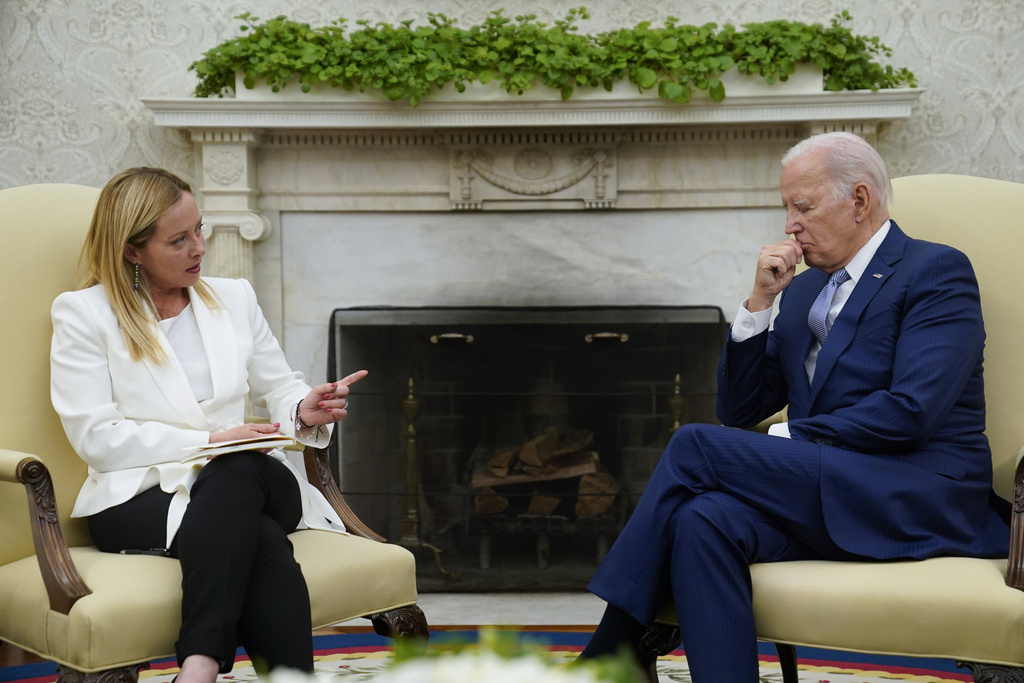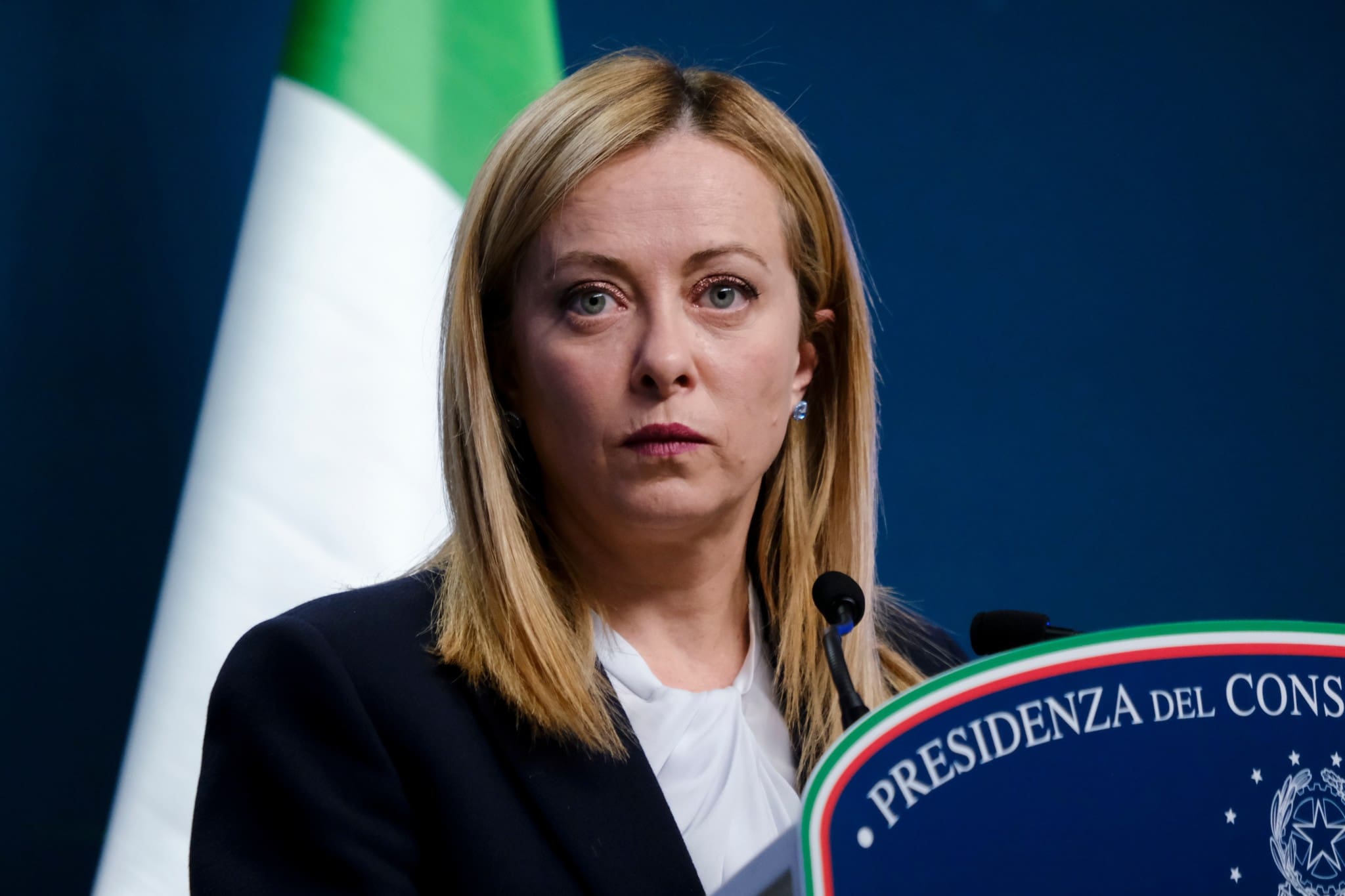Hungarian media has grown increasingly critical of Italian Prime Minister Giorgia Meloni, with a variety of news outlets questioning her commitment to securing the border and preserving Italy’s demographics. The increasing schism between the philosophy and agenda of Hungary’s conservative government and Italy’s conservative government is therefore on stark display, with patience running out over what Meloni campaigned on and what she is actually delivering.
Hungarian news outlet M1 Híradó, for example, published as its top headline yesterday a critical piece on Italy’s leader and her “180-degree turn” on immigration since she was elected leader. Hungary’s M1 Híradó is seen as ideologically aligned with Viktor Orbán’s Fidesz party. However, despite Orbán and other conservative leaders backing Meloni’s campaign, her actions as prime minister have been raising eyebrows in conservative circles across Europe and placed her now in the ranks of pro-migration politicians typically seen on the left-liberal spectrum.
The M1 Híradó article relied heavily on a report from Politico, which outlines the various surprising actions Meloni has taken. As Politico notes, before becoming Italian prime minister, she was the most vocal politician against illegal migration in the European Union. As an opposition politician, she regularly warned of the danger of attempting to replace Italian nationalities with ethnic minorities, and even since taking power, some of her ministers have warned of ethnic replacement, as Remix News has covered in the past in a video short.
However, during Meloni’s time in office, her migration policy took a sharply different direction, resulting in a surge in illegal arrivals, a topic covered extensively on this site.
Perhaps most notably, since taking power, Meloni has introduced legislation that is expected to allow 1.5 million new migrants to enter Italy through legal channels, according to Politico. While Politico may be bordering on praise for Meloni’s liberal migration stance, countries like Hungary, which have championed pro-family policies and fought against mass immigration, are souring on Meloni’s rule.
In addition, the more countries across Europe that pursue a liberal immigration policy to create a cheap labor workforce, the more difficult it makes it for those countries that reject immigration to compete. Italy, it seems, is joining the domino effect, and is seeking to replace its aging Italian workforce with a variety of immigrants, with many of them from the Third World.
The Hungarian article also notes that Meloni is at the helm of an economically stagnant and demographically declining country. Over the past decade, Italy has lost around 1.5 million people (more than Milan’s population). Politico meanwhile notes that in 39 of the 107 provinces, there are more retired than working people.
These figures prompted Italian Economy Minister Giancarlo Giorgetti to warn earlier this month that reform of the pension system “cannot be sustained in the medium to long term at today’s birth rates.”
In many ways, Meloni’s actions amount to throwing in the towel on Italy’s people and embracing a future of multiculturalism, a notable departure from what many saw as a great hope for conservatives in Europe fighting against the Great Replacement.
Meloni’s legal migration regulation estimates that Italy will need 833,000 new migrants over the next three years to fill labor shortages. Matteo Villa, a migration expert at the Institute for International Political Studies (ISPI), a think tank in Italy, says this will be more than enough. He says that given Italy’s family reunification rules, which allow residents to bring relatives into the country, “it is easy to predict that in about 10 years these numbers will triple,” with at least 1.5 million migrants arriving.
There may be varied reasons why Meloni has chosen the path of least resistance on immigration. For one, industrialists in Italy, as in many other Western countries, are concerned about competitiveness They are pushing politicians for more immigrants, and in a country such as Italy with such a dire demographic picture, these industrialists have applied significant pressure on her government.

However, it must also be noted that Meloni is likely well aware that she has struck upon a strong political formula that may ensure her government remains in power longer than some previously believed.
Her Brothers of Italy party (FdI) remains strong in the polls, hovering at 29 percent, and her party remains the most popular in Italy. In fact, Meloni is more popular now than when she was first voted into office despite embracing a very liberal immigration policy. How is this possible?
She has in many ways mastered the art of issuing anti-woke platitudes to the Italian masses while promoting mass immigration at the same time. She has taken some token, nominally conservative positions, and used them to paper over her move toward the left on immigration. She also talks tough on immigration, and for those ingesting quick soundbites, many may not be fully aware of the true state of affairs in Italy. This has kept her popular with low-information conservatives while at the same time protecting her from the wrath of Brussels and the liberal establishment in Europe, which have made various threats in the past if she should step out of line. Italian governments, after all, are notorious for falling from power, often after no more than a year or even months, and Meloni is acutely aware of Brussels’ ability to wage economic warfare against her country’s faltering economy.
In effect, she has the best of both worlds. The conservative base supports her at home and the liberals are nodding in approval from abroad. The liberal EU bloc has a lot to be happy about, considering Meloni’s hawk-like stance against Russia and her open borders policies. There is little reason to make a move against her for the time being. In many ways, politicians such as Dutch Prime Minister Mark Rutte, a notorious critic of Orbán, have been happy to work with her.
[pp id=72925]
Meloni may simply be embracing a formula that has been repeated many times across the West, with conservatives often pushing through the most liberal policies, including the British Conservatives overseeing a record increase in immigration or the German conservatives opening the borders to over 1 million immigrants in 2016.
Meloni had a taste early on of what she would face if she got serious about the messy business of trying to stop the migrant boats from arriving in Italy. Politico speculates that her U-turn may have been prompted by the fact that she came under attack in February after around 100 migrants drowned off the coast of Italy. Meloni said Italy was not responsible, but the establishment media contended that the coastguard failed to send help to a boat that capsized off the Calabrian coast near the town of Cutro. Since then, its government has pointed the finger at rescue boats run by NGOs, accusing them of encouraging migrants to risk crossing, but has been slow to take action outside of some tweaks of the law.
Meloni has also been eager to promote her message about cracking down on illegal arrivals, but as Politico notes, there is little sign that this is working. The number of people arriving by boat after crossing the Mediterranean has more than doubled so far this year to 106,000, compared with 53,000 in the same period last year, according to government figures.
[pp id=76836]
The Italian leader may be counting on her conservative base to simply not notice her changing stance on immigration, and as the polling shows, this may be working. Many of those migrants move on from Italy anyway to other countries, and the effects of Meloni’s plans for a massive boost in legal immigration have yet to be noticed, as that will take a few years to truly dawn on the Italian people. At that point, a new prime minister will likely be in place, and he or she can just say they are simply continuing the policies Meloni put in place.
However, other conservatives who have been waging a war against mass immigration for years have expressed alarm for months now, and as Hungary’s increasingly negative media shows, conservatives in other countries may be beginning to sharpen their knives over what they feel is betrayal.
Nevertheless, Meloni may decide that scorn and criticism from her former conservative allies is an acceptable loss if she can gain the acceptance of the powerful liberal bloc in Brussels.





